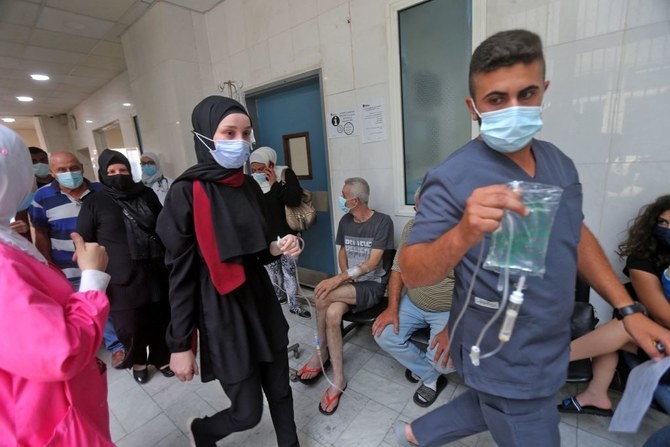BEIRUT: Unvaccinated individuals who spread the coronavirus disease (COVID-19) in Lebanon could be fined 250,000 Lebanese pounds ($165, or a black-market rate of around $10) under a new law ratified by the country’s parliamentarians on Tuesday.
The penalty charge sees an increase on the previous fee of 50,000 Lebanese pounds imposed on people who had not been jabbed but had passed on the virus, the National News Agency reported.
However, the updated legislation did not make vaccination against COVID-19 obligatory.
Lebanese health officials have been urging the public to get inoculated amid a surge in daily infections with 1,707 new cases and 10 virus-related deaths recorded on Tuesday.
On whether citizens would take notice of the fine, Health Minister Dr. Firas Abiad told Arab News: “Within the economic financial situation in Lebanon, and the poverty level, it will certainly have an impact.”
However, Lebanese business manager, Hania Michele, criticized lawmakers for what she described as a “purposeless and meaningless law.”
She told Arab News: “It is not my fault if someone contaminates me with COVID-19 which will keep on spreading anyway. I don’t know if they are doing it purposely, to indirectly force the unvaccinated to get vaccinated.
“Even those who are vaccinated, they could still get infected and spread the virus. That’s why it’s impractical.”
Barber Yousef said less than 40 percent of Lebanon’s population had been vaccinated. “I am unsure if people, who are already bankrupt, would be able to afford paying 250,000 Lebanese pounds. So, why are people not getting vaccinated?
“It is not wrong to fine those who spread the virus, but people are broke and don’t have the money to pay for PCR (polymerase chain reaction) tests,” he said.
Banker, Ghalia Khalil, said that due to the country’s economic crisis the majority of people living in Lebanon could not afford to buy a facemask, never mind pay a hefty fine.
“Many parents and children aren’t complying with health restrictions and remain unmasked … they think if they’re vaccinated, they won’t get infected. The challenge will be in the implementation of the law rather than the stipulation.”
Shop owner, Mohammed Itani, said the lawmakers’ move was inefficient and too late.
“Increasing the fine from 50,000 to 250,000 pounds came very late. We are facing a fourth wave of COVID-19 and the daily infections are scary. Fines should have been made high to force citizens to wear masks and get vaccinated when the outbreak started,” he added.
One Lebanese educational consultant, who would only give her name as Nisreen C., said she would not be getting vaccinated and would rather protect herself by wearing a mask. “I am not getting vaccinated no matter how much it costs or what it takes,” she added.
Schoolteacher, Marwa E., said: “This is a good step, though late. I believe that this steep fine, no matter how harsh it may sound amid our financial downfall, will eventually encourage people to getting vaccinated and wear masks.”


























